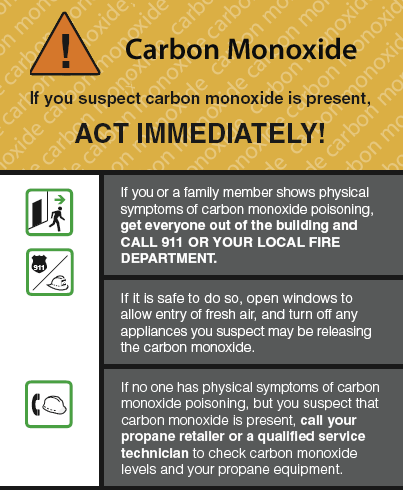 Carbon Monoxide: The Invisible Danger!
Carbon Monoxide: The Invisible Danger!
Carbon monoxide is a colorless and odorless gas that cannot be detected through sense of smell or taste. Exposure to carbon monoxide may cause you to experience any or all of these symptoms:
- Headaches, tightness across the forehead and temples
- Weariness, weakness, dizziness and vomiting
- Loss of muscular control
- Watering and smarting of the eyes
If any of these symptoms develop, move outdoors immediately. Have your propane system and attached appliances inspected and repaired before you return to the building or area where carbon monoxide is suspected.
We do provide two varieties of scientific, quantitative, carbon monoxide testing to our customers. A nominal fee applies to both methods.
How to Prevent Carbon Monoxide Poisoning
- Never use the oven or range top burners to provide space heating.
- Never use indoors, camping, construction, “Mr. Heater,” or other portable heaters that are not designed and listed for indoor use with propane.
- Never use a barbecue grill (propane or charcoal) indoors for cooking or heating.
- Have all appliances tested for proper operation by a qualified propane gas technician.
- Always be certain that your appliances are properly vented.
- Commercially available carbon monoxide detectors should be installed on every level of your home to alert you to the presence of carbon monoxide.
Your safety, and the safe use of your propane gas system are our primary concern. Please contact us if you ever have any questions about the operation, or maintenance of your propane gas system and appliances.
Industry Efforts to Safeguard Propane Use:
GAS Check® is an inspection program developed by the National Propane Gas Association (NPGA) and the Propane Education & Research Council (PERC), and funded by PERC that provides guidelines to technicians on how to perform two different types of residential safety inspections:
- A “Gas System Check” which must be completed on the gas delivery system, including the containers, regulators, and appurtenances; and
- A “Gas Appliance System Check” which includes all of the items of a “Gas Systems Check” as well as on all propane-burning appliances. GAS Check® also educates homeowners on the safe use of propane and the maintenance of propane appliances.

